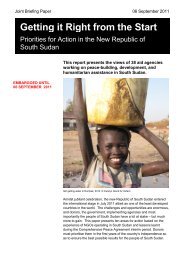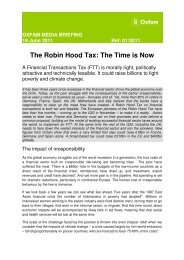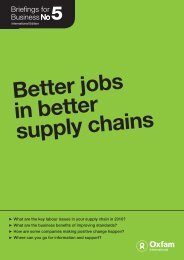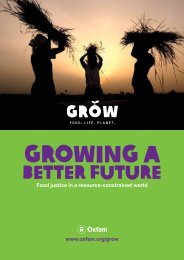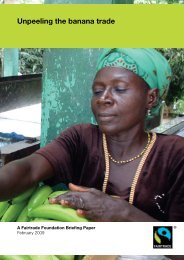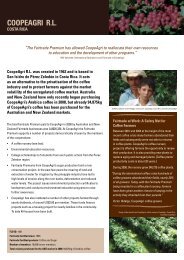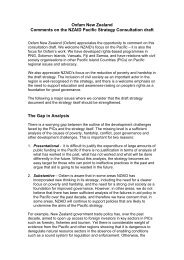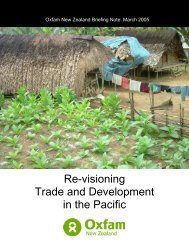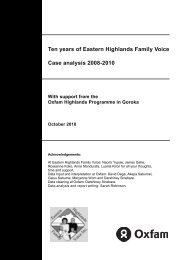Better returns for business.pdf - Oxfam New Zealand
Better returns for business.pdf - Oxfam New Zealand
Better returns for business.pdf - Oxfam New Zealand
- No tags were found...
Create successful ePaper yourself
Turn your PDF publications into a flip-book with our unique Google optimized e-Paper software.
FORTY TWOCivil society organisationsAlthough the project focused on investors, it wasclear that the views and concerns of civil societyorganizations have had relatively little direct influenceon the issues that investors consider in their researchand engagement. Many investors – even those withextensive track records in RI – reported that theirdialogue with civil society organizations had beensporadic, and that many of their discussions werefrustrating because of these organizations’ lackof understanding of how investors work, how theymake decisions or the constraints they face. Thislack of understanding and dialogue was seen ashaving limited the amount of influence civil societyorganizations would or could exert to promotesustainable and responsible investment.‘Charities and foundations should useresponsible investment both to furthertheir mission and to foster their fundingcapacity. However, too few charityinvestors today use their power asinvestment customers to pressure theirfund managers to deliver responsibleownership. For real change, the qualityof asset stewardship needs to drivecharities’ decision-making in selectingtheir fund managers.’Penny Shepherd, CEO, UKSIF EUROSIFYet, the benefits <strong>for</strong> investors of collaborating andworking with civil society became evident in twoareas:• Research on poverty and development-relatedissues, to bring evidence from the ground, data andthe development perspective.• Development of quantitative and qualitativeindicators, as well as standards and norms.In the round, broadly speaking, civil society does notappear to have developed a deep understanding of howthe investment system functions and the limits to theinfluence that investors can exert, and did not have aclear agenda in terms of what they want from investors.While the responsibility lies first with governmentsand then on the investment community, we believecivil society could accelerate and verify progressby considering doing one or more of the followingactivities:• Raise awareness amongst the general public onresponsible investment and development issues, andpossibly mobilize action on these issues.• Provide expertise on poverty-related issues to theinvestment community, and possibly even work with theindustry on specific initiatives.• Hold investors to account <strong>for</strong> the delivery of theirresponsible investment commitments and <strong>for</strong> theimpacts of their investments in developing countries.These activities are likely to require civil societyorganizations to:• Develop their knowledge of the investment industryand understand how institutional investors may help inadvancing their campaigning activities.• Develop initiatives and campaigns to raise awarenessof the relationship between investment and povertyamong their supporters and the public. A centralmessage should be that all those who are employed orwho have individual pensions should seek to influencehow their money is invested.• Monitor the per<strong>for</strong>mance of asset owners and assetmanagers on responsible investment and on specificdevelopment issues.• Lobby governments to adopt responsible investmentlaws and regulations where they do not exist, and tomonitor and en<strong>for</strong>ce compliance more actively wherethey do exist.• Encourage and lobby our organization’s ownpension fund (and any investments they may have)to be managed according to responsible investmentprinciples, and work towards aligning them with theorganizations’ own advocacy objectives.



